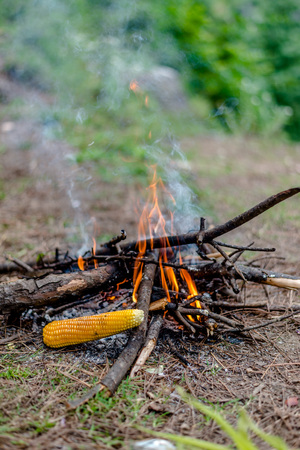Understanding the British Outdoors
If you’re gearing up to pack the perfect camping kitchen for your next UK adventure, it’s crucial to first understand what makes the British outdoors unique. The UK’s weather can change at the drop of a hat—from a sunny morning to a rainy afternoon and back again—so flexibility in your camping kitchen setup is key. Whether you’re pitching up in the misty hills of the Lake District, setting out along the rugged Cornish coast, or exploring Scotland’s wild Highlands, local landscapes and unpredictable conditions will shape what you need to bring. Traditional British campsites range from well-equipped caravan parks to remote wild camping spots, each requiring a different approach to food prep and storage. Think about muddy fields after a downpour, strong coastal winds whipping through your camp, or chilly evenings that call for a warming brew. In short, your kitchen kit should be robust, compact, and ready for whatever the great British weather throws your way. With these factors in mind, you’ll be able to create a truly British camping experience that keeps you well-fed and comfortable wherever your adventure takes you.
Essential Cooking Equipment for UK Campsites
When packing your camping kitchen for a British adventure, the unpredictable weather and diverse campsite facilities mean you need kit that’s both robust and versatile. Here’s a practical rundown of cooking essentials that will serve you well from Dartmoor to the Lake District, whether you’re battling drizzle or basking in unexpected sunshine.
Reliable Stoves: Gas vs. Multi-Fuel
The cornerstone of any camping kitchen is a reliable stove. For most UK campsites, a standard gas canister stove is compact and efficient—ideal for quick cuppas or full English breakfasts. However, if you’re venturing off-grid or wild camping in Scotland, consider a multi-fuel stove, which burns petrol or even wood when gas runs low. Both types light quickly (even in wind), but gas stoves tend to be more user-friendly for beginners.
| Type | Best For | Pros | Cons |
|---|---|---|---|
| Gas Canister Stove | Most campsites, family trips | Lightweight, easy to use, quick ignition | Canisters can run out; less effective in extreme cold |
| Multi-Fuel Stove | Wild camping, remote sites | Versatile fuel options, works in cold/wet conditions | Slightly heavier, requires maintenance |
Pans That Last: Non-Stick vs. Cast Iron
Battling the British elements means you want cookware that won’t let you down. Non-stick pans are brilliant for speedy clean-ups and lighter packs—great for weekend breaks at Peak District sites. For those after a more traditional vibe (or planning to cook over open fire pits allowed at some Welsh coast campsites), cast iron pans retain heat and add flavour, though they do weigh more.
| Material | Ideal Use | Advantages | Drawbacks |
|---|---|---|---|
| Non-Stick Aluminium | Quick meals, light packing | Easy cleaning, lightweight, heats fast | Less durable with metal utensils, avoid high flames |
| Cast Iron Skillet | Open fires, hearty stews or fry-ups | Excellent heat retention, long-lasting | Heavy, needs seasoning and care in wet weather |
Clever Utensils: Multi-Tools & Windproof Gadgets
No one wants to fumble with flimsy cutlery as rain threatens your BBQ. Look for stainless steel utensils that won’t rust after a soggy night and opt for folding versions to save space. A multi-tool with bottle opener and corkscrew is essential for popping local ales or wine beside the tent. Also, pack windproof lighters or waterproof matches—a lifesaver on blustery Cornish cliffs.
Packing Tip:
A simple nesting set of utensils (spatula, serving spoon, tongs) covers most camp meals without cluttering your rucksack. Always keep a microfibre cloth handy for wiping down gear between showers.
In summary:
The British climate demands equipment that’s sturdy yet adaptable—gas or multi-fuel stoves for all conditions, pans matched to your style of camping, and utensils ready for anything from bacon baps to midnight marshmallows. Get these basics right and you’ll eat well whatever the weather throws at you.
![]()
3. Proper Food Storage and Cool Bags
When it comes to packing a camping kitchen fit for UK adventures, keeping your food safe and fresh is absolutely crucial. British weather is famously unpredictable – you might be basking in sunshine one minute and battling a chilly breeze the next. This means your food storage game needs to be on point.
Smart Packing: Storing Food Safely
First things first, always use airtight containers or resealable bags for anything perishable. Not only do they keep out moisture and bugs, but they also help prevent odours from attracting unwanted visitors. If youre bringing meat or dairy, make sure it’s packed at the bottom of your cool bag so it stays coldest for longest. Pro tip: Freeze items like bacon or sausages ahead of time – theyll act as ice packs and give you an extra day of freshness.
Cool Bags & Ice Packs: Your Best Friends
No proper UK camping kitchen is complete without a reliable cool bag or box. Go for one with thick insulation – preferably with a waterproof lining in case the skies open up (classic British summer!). Reusable ice blocks are far superior to loose ice, as they won’t create a soggy mess. For longer trips, consider two smaller cool bags: one for frequently accessed snacks, another for main meals that need to stay properly chilled.
Keep Wildlife at Bay
From nosy foxes to persistent squirrels, British wildlife can be surprisingly crafty when it comes to nabbing your food. Always store edibles in sealed containers and keep them inside your tent’s porch or car overnight. Never leave rubbish bags outside – instead, use designated campsite bins or take it home with you to avoid midnight raids.
Adapting to the British Climate
Finally, remember that temperatures can swing wildly between day and night. Even if the forecast looks mild, pack extra ice packs just in case. On colder nights, move non-perishables into your tent to stop condensation spoiling them. And if you’re lucky enough to catch a heatwave, try to park your cool bag in the shade during the day for maximum chill.
4. Water and Brew Kit Essentials
Every British camper knows that a proper brew is as vital as a sturdy tent, and safe drinking water is absolutely non-negotiable. Whether you’re wild camping in the Lake District or pitching up at a festival, packing the right water and tea-making kit can make or break your outdoor experience. Here’s what you’ll need for a cracking cuppa and clean hydration wherever you roam:
Must-Have Water Gear for UK Camping
| Item | Purpose | Recommended Features |
|---|---|---|
| Reusable Water Bottles | Staying hydrated throughout the trip | BPA-free, insulated, large capacity (1L+) |
| Collapsible Water Containers | Transporting and storing larger volumes at camp | Leak-proof, easy to pack, minimum 5L size |
| Water Filter or Purification Tablets | Ensuring safe drinking water from natural sources | Removes bacteria/viruses, lightweight, quick-use |
| Pocket-Sized Hand Sanitiser | Keeping hands clean before meal prep or tea-making | Quick-dry gel, alcohol-based for effectiveness |
The Essential Brew Kit: No Compromises!
No matter where you’re pitched up in the UK—be it beside a misty loch or on a breezy Cornish clifftop—a decent brew is a must. Here’s your checklist for making that all-important cup of tea (or coffee):
- Kettle: Go for a lightweight camping kettle suitable for your stove type (gas or solid fuel). If weight is an issue, collapsible silicone kettles are spot on.
- Mugs: Insulated mugs with lids keep your brew hot longer, especially when the British weather turns nippy.
- Brew Bags & Coffee Sachets: Pack enough Yorkshire Tea bags or your favourite ground coffee. Individually wrapped sachets are ideal for freshness.
- Sugar & Milk Options: UHT mini-milks or powdered milk are compact; don’t forget sugar packets if that’s your style.
- Spoon/Stirrer: A reusable spoon or bamboo stirrer to keep things eco-friendly.
- Mini Washing-Up Kit: Small bottle of biodegradable washing-up liquid and sponge for cleaning up after your brew session.
A Quick Brew Kit Comparison Table
| Brew Kit Item | Why It Matters for UK Campers | Packing Tip |
|---|---|---|
| Camping Kettle | Essential for boiling water safely on any stove or campfire | Nest smaller items inside when packing to save space |
| Insulated Mug with Lid | Keeps your drink warm in unpredictable British weather conditions | Packs easily, doubles as soup bowl in emergencies! |
| Brew Bags (Tea/Coffee) | The heart of every British campsite – morale booster and tradition in one! | Keep in a waterproof pouch to avoid dampness ruining your stash |
| Sugar & Milk Alternatives | Adds comfort and personal touch; crucial for some campers’ enjoyment! | Single-serve packets reduce mess and waste; easy to share around the group too! |
Packing Pro-Tip:
Tuck your entire brew kit into a dedicated dry bag within your kitchen box. This keeps everything together, dry, and ready for action whenever that next round of teas is called for—rain or shine!
5. Smart Packing and Organisation Hacks
Packing your camping kitchen efficiently is just as important as choosing the right gear, especially when space is at a premium in the British countryside. Here are some practical tips and UK-specific tricks for keeping your kitchen kit tidy, clean, and ready for action.
Compact Containers and Stackable Solutions
Invest in stackable, airtight containers to keep dry goods like tea bags, sugar, and porridge oats fresh and easy to find—essentials for any British breakfast. Opt for clear tubs so you can see what’s inside at a glance. Collapsible silicone bowls and measuring cups also save precious space.
Multi-Use Items Save Space
Choose utensils that serve more than one purpose—think sporks, nesting pots, or a chopping board that doubles as a serving tray. This keeps your kit streamlined without sacrificing function, perfect for those brisk mornings on Dartmoor or rainy evenings in the Lake District.
Clever Packing Order
Always pack heavier items like gas canisters or cast iron pans at the bottom of your bag or storage box, with lighter or fragile items—like enamel mugs or glass condiment bottles—on top. Keep quick-access essentials (tea towels, matches) near the opening for hassle-free cuppas or emergency bacon sarnies.
Stay Clean with British Ingenuity
Use reusable shopping bags (very handy with the UK’s plastic bag charges) to separate clean from dirty items. A foldable washing-up bowl and biodegradable soap make washing up at remote campsites easier—and more eco-friendly. Carry a microfibre cloth for quick wipe-downs; they dry fast even in the unpredictable UK weather.
Bonus Hack: Beat the British Weather
If you’re expecting rain (which is always wise), stash a small tarp or bin bag in your kit to create a dry prep area under your shelter. Store matches and tea bags in waterproof pouches so nothing dampens your spirits—or your morning brew!
6. UK Legalities and Campsite Etiquette
Packing the perfect camping kitchen for a UK adventure isn’t just about having the right kit – it’s also about respecting the countryside, following local laws, and embracing British campsite culture. Here’s a practical guide to help you stay on the right side of the rules and ensure everyone enjoys their outdoor experience.
Respecting Site Rules
Most UK campsites have specific regulations regarding cooking equipment, waste disposal, and noise levels. Always check if disposable BBQs or open fires are permitted before setting up your camp kitchen; many sites only allow raised stoves or designated fire pits due to safety concerns. Stick to established pitches and communal cooking areas where provided, and never use indoor stoves in tents for safety reasons.
Leave-No-Trace Principles
The UK countryside is treasured, so “leave no trace” is more than a motto – it’s expected behaviour. Pack out all rubbish (including micro litter like tea bags and foil from food), use biodegradable soap if washing up outdoors, and avoid contaminating water sources. If wild camping (where permitted in Scotland or with landowner’s consent elsewhere), dismantle your kitchen setup completely and leave your spot exactly as you found it.
British Camping Do’s and Don’ts
Do greet fellow campers with a friendly nod or chat, especially in smaller sites – it’s part of the British way! Keep noise down after 10pm, and don’t let your cooking aromas drift too far; strong smells can be intrusive. Always store food securely to deter wildlife, and never feed animals. Remember that washing-up areas are shared spaces: clean up promptly and leave them tidy for others.
By packing thoughtfully and respecting these uniquely British customs, your camping kitchen will enhance your trip without causing hassle for others or harm to the environment. It’s all about blending practicality with politeness – the true spirit of UK camping!


